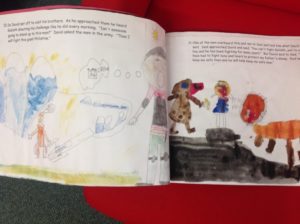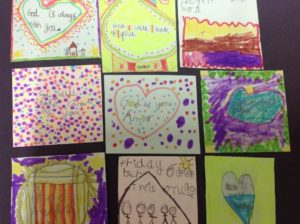- Religious Education Policy (825.87KB)
- Spring 2 RE Knowledge Organiser for Children (868.73KB)
- R.E Knowledge Oganisers (668.85KB)
Religious Education at our school:
 RE is concerned with “learning about religions” and “learning from religion” and it is not the practice of this school to preach to or convert the children. The faith background of both the staff and child’s family is respected at all times.
RE is concerned with “learning about religions” and “learning from religion” and it is not the practice of this school to preach to or convert the children. The faith background of both the staff and child’s family is respected at all times.
Intent and Purpose of Study
“Religious education in a Church school should enable every child to flourish and to live life in all its fullness. (John 10:10). It will help educate for dignity and respect encouraging all to live well together.” ( from A Statement of Entitlement -Church of England 2019)
We believe that RE both supports and strengthens what we aim to do in every aspect of school life. Our caring ethos, our vision and the value which we place on the development of the whole child; spiritually, morally, socially, culturally and intellectually, is reflected in the RE curriculum.
RE provokes challenging questions about the ultimate meaning and purpose of life, beliefs about God, the self and the nature of reality, issues of right and wrong and what it means to be human. It challenges pupils to reflect on, consider, analyse, interpret and evaluate issues of truth, belief, faith and ethics and to communicate their responses.
At this school we aim to;
- achieve high quality RE for all pupils.
- enable pupils to become religiously and theologically literate so they can engage in life in an increasingly diverse society. (Theology – believing)
- ensure that all pupils develop knowledge and understanding of sources of wisdom and their impact whilst exploring personal and critical responses. (Philosophy – thinking)
- recognise and explore the diversity which exists within and between religious traditions – how faith is lived and experienced (Sociology – living)
- develop the skills required to engage with others in dialogue and to cooperate in society with respect and compassion
Implementation – Content and approach
As RE is not nationally determined a locally agreed syllabus of RE is prepared by a local Standing Advisory Council on Religious Education (SACRE) and adopted by a local authority. It is this Hertfordshire Agreed Syllabus of Religious Education 2017-2022, which we have used as the basis of our planning and delivery of RE.
This Agreed syllabus outlines the eight key areas that should be covered within each phase/key stage. These include;
Belief and practices; Sources of wisdom; Symbols and actions; Prayer, worship and refection
Identity and belonging; Ultimate questions; Human responsibility and values; Justice and fairness
These are mapped out on our long term plan and children are guided to consider them after modules of work through our Theme wheels.
In addition we use the ‘Understanding Christianity’ National Resource, the Bedfordshire scheme of work and Suffolk ‘Emmanuelle’ project materials to support our planning of the Hertfordshire Agreed Syllabus and as such have developed our own bespoke R.E curriculum, which is mapped out through our Knowledge Organisers.
From EYFS classes to Year 6 pupils follow a coherent and systematic study of the principal religion of Christianity across each key stage and are introduced to the other five principal religions represented in Great Britain by the end of key stage 2.
| World religions studied | ||||
| EYFS | Children will encounter Christianity and religions and beliefs represented in the class, school or local community. Religious Education will support a growing sense of the child’s awareness of self, their own community and their place within this. | |||
| Key Stage 1
(At key stage 1 a minimum of two religions are studied) |
Christianity
Islam |
Christianity
Judaism
|
||
| Key Stage 2 | Year 3 | Year 4 | Year 5 | Year 6 |
| Christianity
Islam |
Christianity
Sikhism |
Christianity
Judaism |
Christianity
Hinduism Buddhism |
|
Short term planning of individual lessons is a matter for the class teacher.
 Implementation –
Implementation –
The teaching of RE involves some direct teaching and whole class, group, paired or individual activities. Through a range of strategies, such as: enquiry, exploration, discussion, asking and answering questions, artefacts, visits and visitors of faith and belief, pupils are actively engaged in learning.
Time Allocation for RE
In line with the requirements of the Hertfordshire Agreed Syllabus of Religious Education 2017-2022:
At EYFS RE is delivered flexibly according to the statutory requirements of the EYFS
At Key Stage 1 pupils spend 60 hours over 2 years (approximately 10 hours per term)
At Key Stage 2 pupils spend 156 hours over 4 years (approximately 13 hours per term).
These minimum time requirements include visits and RE curriculum days but not school productions related to festivals, assembly or collective worship time.
Withdrawal
At this school it is our practice to talk to parents to ensure that they understand the aims and value of the RE curriculum before honouring the right of withdrawal from RE. Any parent who wishes to withdraw their child is expected to consult the headteacher.
